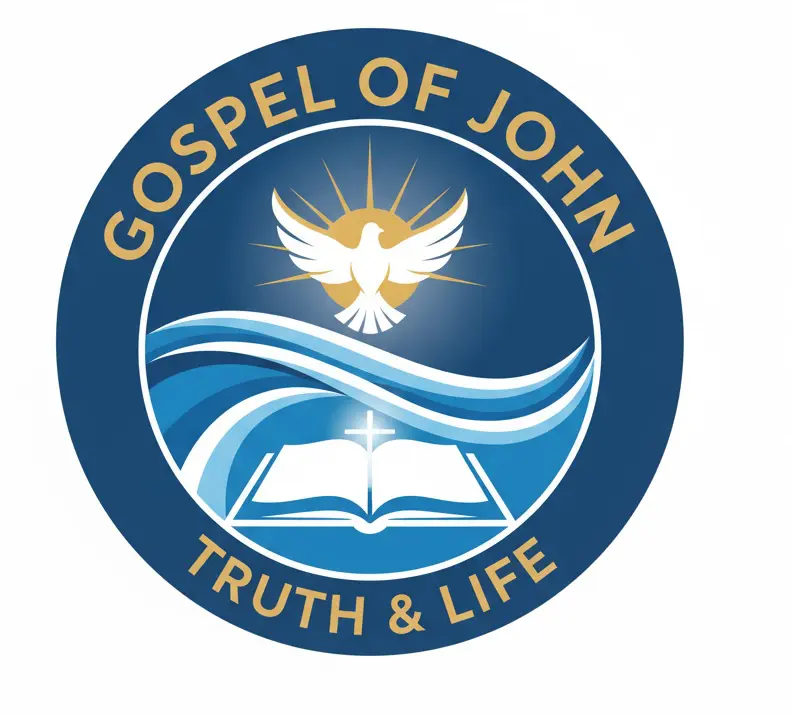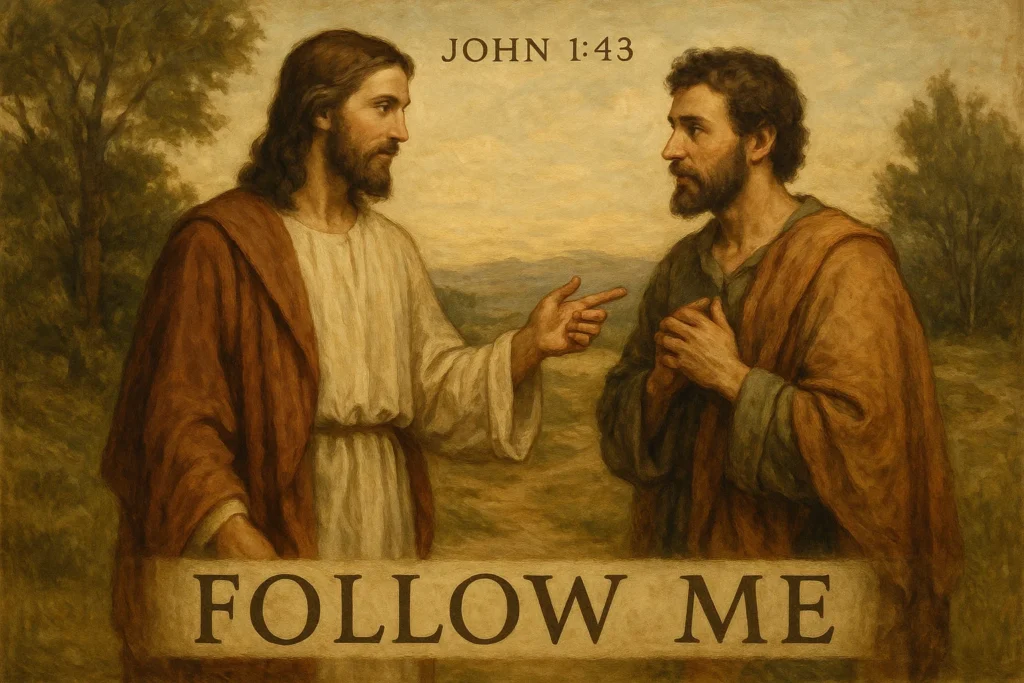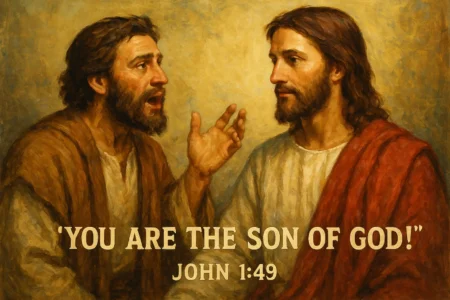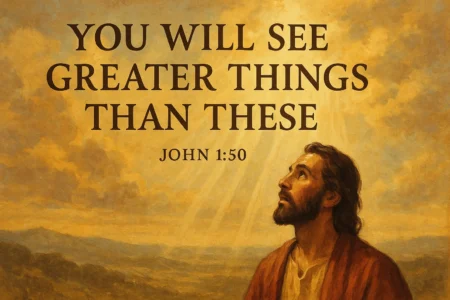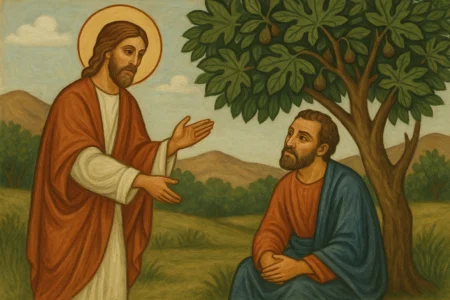It’s just two words.
“Follow me.”
In our hyper-connected, noisy world, we see this phrase everywhere. It’s a button on social media. It’s a casual request. It’s lost its punch. But in the dusty roads of first-century Judea, those two words, spoken by one specific man, were an invitation that would alter eternity. They were a command that would sever a person from their past and bind them to a new, radical future.
We see this explosive power in a short, simple verse tucked away in the first chapter of John’s Gospel. John 1:43. It’s so brief, you could blink and miss it. “The next day Jesus decided to go to Galilee. He found Philip and said to him, ‘Follow me.'”
That’s it. That’s the entire verse.
But to breeze past it is to miss a profound drama. This isn’t just a historical logbook entry; it’s a model for one of the most personal and transformative experiences a human can have. When we dig into John 1:43 Explained, we’re not just looking at a man named Philip. We’re looking at a pattern that still echoes today. We’re looking at ourselves.
More in John Chapter 1 Category
Key Takeaways
Before we dive deep, here’s the lay of the land. Understanding this single verse opens up a massive theological framework.
- Divine Initiative is Everything: Jesus is the one who acts first. The text says, “He found Philip.” Philip wasn’t searching; he was sought. This theme of God as the seeker, not the other way around, is central to the Christian faith.
- The Call is Always Personal: Jesus didn’t just shout into a crowd, “Whoever wants to, come along!” He sought out a specific individual, Philip, and gave him a personal, direct invitation.
- The Call is Simple, Not Easy: The command is “Follow me.” It’s direct and uncomplicated. It doesn’t come with a 50-page manual or a list of theological prerequisites. But this simple command implies leaving everything else behind.
- A Real Call Demands a Real Response: The verse itself doesn’t record Philip’s answer, but the very next verse shows it. Philip immediately goes and finds his friend Nathanael. The proof of being “found” is that you become a “finder.”
- Location Matters: Jesus decided to go to Galilee. This wasn’t a random vacation. He was deliberately moving his base of operations from the religious periphery (John the Baptist’s location) to the common person’s homeland.
What Was Happening Right Before This Moment?
To truly get John 1:43, you have to rewind the tape by about 24 hours. This verse doesn’t happen in a vacuum. It’s the climax of a chain reaction.
The chapter opens with John the Baptist, the wild-eyed prophet, doing his work by the Jordan River. He’s the spiritual bouncer of his day, telling everyone the real V.I.P. is about to arrive. And then, he sees Jesus. He points and shouts, “Behold, the Lamb of God, who takes away the sin of the world!”
Let’s not skim over that. That’s a bombshell. “Lamb of God” was a loaded phrase. It’s Passover. It’s sacrifice. It’s the symbol of national redemption. It’s an insane thing to call a man walking by the river.
Two of John’s own disciples hear this.
One is Andrew. The other is unnamed, but widely believed to be John, the author of this very Gospel. Their worlds are instantly turned upside down. They hear the testimony, and they immediately leave their old master to follow this new one.
Their first day with Jesus is so staggering that Andrew can’t contain himself. He sprints off to find his brother, Simon (who we know as Peter). You can almost hear him, out of breath, grabbing his brother by the shoulders: “We have found him! We have found the Messiah!” He then drags Peter to meet Jesus, who promptly renames him, rocking his identity to the core.
All of this is the backdrop. Excitement is building. A movement is starting. The air is electric with the sense that everything is about to change.
And that’s when we read our verse: “The next day…”
This isn’t an accident. This isn’t Jesus just wandering around hoping to build a team. This is a deliberate, day-by-day plan of recruitment. Day one: Andrew and John. Day two: Peter. And now, on day three, Jesus has a specific target in mind.
Why Did Jesus Decide to Go to Galilee?
The text says, “Jesus decided to go to Galilee.” This is a crucial detail.
At this point, they are in Bethany, “beyond the Jordan” (John 1:28), which is in Judea. This is John the Baptist’s turf. It’s the “religious” zone, the place you go for a spiritual experience. But Jesus makes a conscious decision to leave.
Why Galilee?
Galilee was… well, it was the sticks. It was the northern region, looked down upon by the Jerusalem elite. It was a place of farmers, fishermen, and tradesmen. It was considered uncultured, a bit rough around the edges, and even religiously “compromised” due to its proximity to Gentile nations (earning it the name “Galilee of the Gentiles”).
Remember, this is the region that would later prompt the skeptical question, “Can anything good come out of Nazareth?” The attitude was one of open contempt.
In short, it was home. It was Jesus’s home.
By “deciding” to go to Galilee, Jesus is making a powerful statement. He is signaling that His ministry will not be centered in the halls of religious power in Jerusalem. It will not be for the “in-crowd,” the theologically astute, or the culturally refined.
His ministry will be among the ordinary, the overlooked, the working class. He isn’t waiting for the elite to come to him; He is going to the people.
This decision wasn’t just a travel plan. It was a mission strategy. And it was in this “ordinary” place that He would find His next recruit. He had to go to Galilee because that’s where Philip was.
“He Found Philip” – Did Jesus Just Stumble Upon Him?
This is the part of the verse that gives me chills. “He found Philip.”
Think about that. It doesn’t say, “Philip, after a long spiritual journey, finally found Jesus.” It doesn’t say, “Philip and Jesus happened to be at the same marketplace.” The Greek word used here is heuriskō, from which we get our word “eureka!” It means to find, to discover, often after a search.
Jesus was looking for him.
This completely flips the script on how we often view faith. We talk about “finding God,” but this verse, and many others, frames it the other way around: God is the one who finds us.
I remember a time in my early twenties when I felt incredibly lost. I’d moved to a new city for a job, knew no one, and was adrift in a sea of anonymity. I felt invisible. I would sit in my tiny apartment feeling like if I disappeared, no one would even notice for a week. That feeling of being an unnamed face in a crowd is crushing.
One Saturday, an older guy from my new office, a man I barely knew, called me out of the blue. “Hey,” he said, “I know you’re new here, and I’m guessing you don’t have plans. My family’s grilling burgers. You should come over.”
It was such a simple invitation.
But to me, it felt like a rescue. He had thought of me. He had sought me out. That simple act of being “found” made me feel seen, valued, and anchored. It changed my whole experience in that city.
That is a pale shadow of what is happening in John 1:43. Philip, for all we know, is just going about his day. Maybe he’s mending nets or heading to the market. And the Son of God, the “Lamb of God,” the “Messiah,” walks right up to him. He was on Jesus’s agenda.
This is the staggering grace of divine initiative. Before we ever have a “good thought” about God, He is already moving toward us. He knows our name. He knows our location. And He comes to find us right where we are.
So, Who Was This Philip?
Why Philip? What was so special about this guy?
The Bible doesn’t give us a full biography, but it gives us fascinating clues. The very next verse, John 1:44, tells us: “Now Philip was from Bethsaida, the city of Andrew and Peter.”
This is no coincidence. Jesus is building His team from a pre-existing social network. Andrew, Peter, and Philip were all from the same small fishing village. They almost certainly knew each other. They probably grew up together, played together, worked together.
This tells us something profound about how God works: He moves through relationships.
But Philip is a different personality type from the brash, impulsive Peter. Later in the Gospels, we see Philip as the more analytical, pragmatic, almost “show-me” kind of guy.
Was Philip a Skeptic or Just a Pragmatist?
I’ve always loved Philip because I relate to him. He seems to be the “numbers guy” of the group.
Look at his track record:
- When the 5,000 are hungry, Jesus tests Philip, “Where are we to buy bread for these people?” Philip’s response is pure practicality: “Two hundred denarii worth of bread would not be enough for each of them to get a little!” (John 6:5-7). He’s the numbers guy. He’s already done the math and concluded “it’s impossible.”
- When some Greeks want to meet Jesus, they don’t go to Peter. They approach Philip (who has a Greek name, hinting he was more connected to the wider world). Philip doesn’t just bring them; he first goes and consults with Andrew (John 12:20-22). He’s a processor, a bit of a literalist. He needs a second opinion.
- At the Last Supper, after all Jesus has said, Philip is the one who says, “Lord, show us the Father, and it is enough for us” (John 14:8). He wants tangible, visible proof.
Jesus knew all this. He knew Philip was a pragmatist. He knew he was a bit of a skeptic. And He still sought him out. He didn’t just want impulsive “yes-men.” He didn’t just want fiery, leap-out-of-the-boat guys like Peter. He wanted the thinkers, the questioners, the “prove-it” guys, too.
I get this. I’m the guy who reads the manual before assembling the IKEA furniture. My wife? She just dumps the box and starts matching pieces. Jesus, in His wisdom, seems to want both types on His team.
What Did “Follow Me” Actually Mean to a First-Century Jew?
Those two words. “Follow me.”
Today, this means “watch my content” or “agree with my ideas.” To Philip, it meant something drastically more literal and life-altering.
In that culture, the relationship between a rabbi (teacher) and his talmidim (disciples) was intense. It wasn’t like signing up for a college course. When a rabbi said, “Follow me,” he was issuing a call to total commitment.
A disciple would literally:
- Abandon his entire livelihood. This wasn’t just “quitting a job.” For a fisherman or farmer, it meant leaving the family business, the only trade he knew, his only source of income. It meant abandoning his financial future.
- Leave his home and family. He would physically follow the rabbi wherever he went, sleeping on the road, in fields, or in the homes of supporters. It was a life of vagrancy, total dependency, and social dislocation.
- Submit to the rabbi’s total authority. His goal was not just to learn what the rabbi knew, but to become like the rabbi was. There was a famous Jewish saying that a good disciple should be “covered in the dust of his rabbi,” meaning he followed so closely that the dust kicked up from the rabbi’s feet would cover him.
This was a call to imitation, not just information. You can learn more about the deep cultural expectations of this rabbinical-disciple relationship on university sites covering ancient Jewish education.
When Jesus said, “Follow me,” He was bypassing the entire established rabbinical system. He wasn’t a certified rabbi from a recognized school. He was a tradesman from Nazareth. Yet He spoke with an authority that surpassed them all. He wasn’t just saying, “Learn my interpretation of the Torah.” He was saying, “I am the Way. Stake your entire life on me.”
This was an all-in proposition. It was a call to abandon his old life, his old loyalties, and his old identity, all for a new one found only in Jesus.
How Is This Call Different from the Other Disciples’?
It’s also fascinating to see how Jesus calls different people. There is no one-size-fits-all formula.
- Andrew and John: They were called through the public testimony of another (John the Baptist). They heard a message, and they acted on it.
- Peter: He was called through the personal invitation of a family member. He was brought to Jesus by his brother, Andrew.
- Philip: He was called by the direct, sovereign approach of Jesus Himself. Jesus sought him out, seemingly out of the blue, and gave him a personal command.
This is a beautiful picture of how people still come to faith today. Some hear a sermon or read a book (testimony). Some are invited by a friend or relative (invitation). And some have a powerful, personal experience where they feel God “found” them when they weren’t even looking (direct call).
God isn’t limited to a single method. He tailors the call to the individual. For the pragmatic, analytical Philip, perhaps a simple, direct, undeniable command was the only thing that would cut through his natural skepticism.
What Was Philip’s Immediate Reaction? (And Why Does It Matter?)
So, what did Philip say? “Let me think about it?” “Can I see your credentials?” “What’s the pay and benefits package?”
The text doesn’t record his verbal reply. It doesn’t need to. His actions in the very next verse are his answer.
Verse 45: “Philip found Nathanael and said to him, ‘We have found him of whom Moses in the Law and also the prophets wrote, Jesus of Nazareth, the son of Joseph.'”
This is incredible.
The man who was found immediately becomes a finder. The one who received the call immediately becomes a messenger. He is so utterly convinced by this encounter that his first, instinctive impulse is to run and tell his best friend.
This is the vital, explosive, and natural consequence of truly “following” Jesus. It’s not a private, internal experience that we quietly ponder. It’s a discovery so good, so world-changing, that it must be shared. It spills out of us.
Philip’s response shows us:
- He Understood: He didn’t just think Jesus was a “cool teacher.” He connected the dots. This is the one Moses and the prophets wrote about! This is Him.
- He Was All-In: His immediate evangelism proves he took the “follow me” command seriously. He was now on the team.
- He Began with His Relationships: He didn’t go to the town square with a megaphone. He went to his friend, Nathanael. The Gospel spreads along the lines of natural human relationships.
Why Would He Run to Nathanael, of All People?
This makes the story even better. Philip runs to his friend Nathanael, who we know from later in the chapter is a “true Israelite, in whom there is no deceit.” This is a seriously devout man. A man who studies the scriptures under a fig tree. He is no lightweight.
And Philip, the pragmatist, hits him with this incredible news. And Nathanael’s reaction is instant, skeptical, and famously sarcastic: “Nazareth! Can anything good come from there?”
I love this. It’s so human. It’s exactly what a friend would say. “Jesus from Nazareth? The armpit of Galilee? You’ve got to be kidding me.”
Philip, to his eternal credit, doesn’t argue. He doesn’t get into a theological debate. He doesn’t get defensive. He gives the most perfect, simple, and powerful response in the entire chapter.
“Come and see.”
He was so confident in his experience with Jesus that he knew it could stand up to his friend’s skepticism. He didn’t need to have all the answers. He just needed to get his friend in the same room with Jesus.
This is the pattern. We are found. We go find others. And our call isn’t to have all the answers, but to simply say, “I’ve met someone. You have to see for yourself. Come and see.”
How Does This Two-Word Command Apply to Us Today?
This is the real question, isn’t it? It’s a great story. But what does “John 1:43 explained” mean for me, in my office, in my home, in the 21st century? Jesus isn’t going to physically walk up to me in Galilee.
The call, “Follow me,” is the same, but it looks different on the outside.
I struggled with this for a long time. I was waiting for a “burning bush” moment, a lightning bolt, an audible voice from heaven telling me what to do with my life. I think that’s why I connect with Philip’s analytical nature. I wanted a sign.
My “calling” into my current line of work wasn’t like that at all. It wasn’t a single, dramatic event. It was more like a slow, dawning realization. It was a “finding” that happened over years. It was a persistent, gnawing dissatisfaction with the path I was on, a path I had chosen for money and status. It felt like I was wearing clothes that were one size too small, every single day.
Simultaneously, it was a growing, quiet pull toward something else, something that involved serving people instead of just serving a bottom line. It wasn’t a lightning bolt; it was a slow sunrise.
It was a “follow me” spoken not in a single voice, but through:
- Conversations with my wife, who saw my discontent.
- A “random” article I read that sparked an idea and wouldn’t leave me alone.
- The advice of a mentor who saw something in me I didn’t.
- A deep, unshakeable “knowing” in my gut that I had to make a change.
Jesus “found” me not on a dusty road, but in the doldrums of a career that was draining the life out of me. The call to “follow” was a call to leave that comfortable, predictable life for something unknown, something that felt more aligned with Him. It was terrifying. And it was the best decision I ever made.
For us today, “Follow me” is a call to:
- Reorient Our Priorities: It means His will, His character, and His mission become our new “true north.” Everything else gets filtered through that.
- Obey His Teachings: It means we don’t just admire the Sermon on the Mount. We try to live it. We practice forgiveness when it’s hard, humility when we want praise, and radical love for people we don’t even like.
- Imitate His Character: We look at how Jesus treated the marginalized, the poor, and the “unlovely,” and we go and do likewise.
- Participate in His Mission: Like Philip, we who have been “found” become “finders.” We share the good news, we serve our communities, we bring light to dark places, starting with our own friends and families.
Is the Invitation Still Open?
Yes.
That’s the simple, beautiful, and staggering truth. The invitation is not a historical artifact. It’s a living, breathing, and present-tense reality.
Jesus is still seeking. He is still finding.
He finds us in our successes and in our spectacular failures. He finds us in the joy of a new baby and in the grief of a hospital room. He finds us in our cubicles, our kitchens, our classrooms, and our cars.
And the call is the same. “Follow me.”
It’s not a call to be perfect. Thank God. Look at the disciples; they were a mess. Peter would deny Him. Philip would doubt Him. They would all abandon Him. And yet, He called them. He calls us, knowing our flaws, our skepticism, and our failures.
It’s a call to relationship. It’s a call to a journey.
Even this morning, “following” for me meant something small but real. It meant putting my phone down when my daughter wanted to tell me a long, rambling story about her dream. It meant choosing to pray for a difficult colleague instead of just complaining about him.
It’s a daily, hourly decision.
John 1:43 is more than a 2,000-year-old sentence. It is an echo of the most important invitation you will ever receive. It’s the story of a God who knows your name, who travels to your “Galilee,” finds you in the middle of your ordinary life, and with all the authority in the universe, gives you a simple, two-word command that changes everything.
“Follow me.”
FAQ – John 1:43 Explained
Why did Jesus go to Galilee to find Philip, and what does this tell us about His ministry?
Jesus deliberately chose to go to Galilee, a region considered peripheral and overlooked, to demonstrate that His ministry was for the ordinary, marginalized, and overlooked people, emphasizing that His mission was among everyday individuals, not just the religious elite.
How does the story of Philip’s calling illustrate divine initiative and personal response?
The story shows that Jesus actively seeks out individuals like Philip, highlighting divine initiative, and that genuine followership requires an immediate, wholehearted response, exemplified when Philip promptly shares his discovery with others after meeting Jesus.
In what ways can we understand ‘Follow me’ as a personal invitation today?
Today, ‘Follow me’ is understood as a call to reorient our priorities, obey Jesus’ teachings, imitate His character, and actively participate in His mission, translating the original call into everyday choices and lifestyles.
What does the phrase ‘Come and see’ teach us about sharing faith with skeptics?
The phrase ‘Come and see’ underscores the importance of personal experience and confidence in Jesus’ transformative power, encouraging believers to invite skeptics to encounter Jesus directly rather than relying solely on arguments or explanations.
